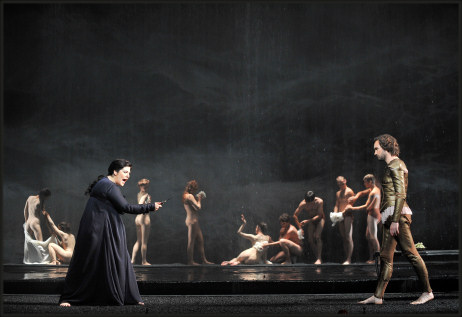Other Links
Editorial Board
- Editor - Bill Kenny
- London Editor-Melanie Eskenazi
- Founder - Len Mullenger
Google Site Search
SEEN
AND HEARD INTERNATIONAL OPERA REVIEW
Giovanni Battista Pergolesi, Salustia:
new production by Jean-Paul Scarpitta for Le Festival de Radio
France et Montpellier Languedoc-Rousillon, soloists and orchestra La
Capella della Pietà de'Turchini, Antonio Florio conductor. Opéra
Comédie, Montpellier, France. 28.7.2008 (MM)
Wonders never cease. Certainly the weirdest wonder of the current
festival season in the South of France (and perhaps anywhere in the
world so far this century) was the world premiere [!] of Pergolesi's
first opera Salustia. The young composer was but 21 years
old in 1732 when he wrote it, and soon realized he must re-think the
whole art form. He is now far better known as Pergolesi, the
new-age composer of La Serva Padrona.

The program booklet provides a detailed biography of Pergolesi,
notes on opera seria and this opera, a three-page apology of
some sort by the metteur en scène, plus a full-page color
portrait of the young composer. All this is a lot to read, never
mind digest in the twenty minutes time one generally has between
arriving at the opera house and the curtain going up. In fact it
was impossible even to try. Thus this performance, as all
performances should, had to stand on its own.
As is the wont of Baroque opera the 'action' was more
reaction, three and one half hours (one brief intermission) of aria
after aria, usually unleashing fury of some sort, though there were
some quite beautiful softer moments. The talented young Pergolesi
did treat us to one brief duet, and a complex, very effective
quartet buried inside the second half, fortelling the coming of
dramatic action through the music.
There were two full, single spaced, paragraph-less pages of
synopsis. Essentially however, the selfish Giulia wants to get rid of her
son Alessandro's wife Salustia, whose not very bright father
Marziano was a war hero who in turn wants to get rid of Giulia. Salustia's
friend Alina loves the father's not-so-bright friend Claudio who
cannot bear her. Salustia saves the cruel mother from being
murdered by her father and everyone lives happily ever after.
All this made metteur-en-scène Jean-Paul Scarpitta think of
water for some reason. The curtain rose on ten dancers frolicking on a water covered
black stage floor with some Afghanistan-looking hills as a
backdrop. Down stage center there was a large platform-trolley
covered with a dirt like substance (though neither dirty, dusty nor
eventually muddy) on which the singers stood or in which they rolled
while the platform was pushed back and forth across the proscenium
with great (simulated) effort by two wannabe Hercules(es).
In the second half of the evening, hems of costumes were
still being soaked by the perpetually water covered stage floor.
The Baroque's mandate for scenic marvels was honored when a huge
curtain of rain replaced the dry hills as the stage backdrop, under
which various mute men and ladies-in-waiting bathed one another
(male-male, female-female, then male-female, you name it).
These instruments of movement - one hesitates to call them dancers - offered their own voiceless additions to the story, adding lots of
meaningful looks and meaningful touching which often had
strange sexual connotations. Although the opera has a happy ending,
one silent friend of the cruel, turned forgiving, mother was moved to
murder Salustia at one point. Then, Salustia, resurrected was left alone on the stage, her family celebrating what was to
have been an uplifting ending in an off-stage, i.e. faraway,
sextet. Thus Pergolesi's big, singerly, reconciliation
wrapping up this quite frankly startling opera, simply vanished.
Pergolesi's surely fine vocal writing was overwhelmed both by Sig.
Morelli's weird libretto and by Jean Paul Scarpitta's bizarre
gloss. One yearned for the opportunity to discover the voice of
this important new composer. Of the singers only soprano Maria
Ercolano, the Salustia herself, brought true operatic excitement to
the stage, and it was formidable. Valentina Varriale cut a fine
vocal figure as the deceitful if loving Albina, adding some welcome
excitement from time to time. The cruel mother Giulia is a huge
role, and would have profited from a larger-scale, older singer,
though soprano Raffaella Milanesi did it full justice. Counter-tenors
were completely missing, neither the Alessandro of mezzo José Maria Lo Monaco
nor the Marziano of alto Marina De Liso filled the pants of these
two wimpy male roles. The Claudio of tenor Cyril Auvity
was painful to listen to.
Now, let me see if I can find that program booklet.
Michael Milenski
Picture © Mark Ginot
Back to Top Cumulative Index Page
